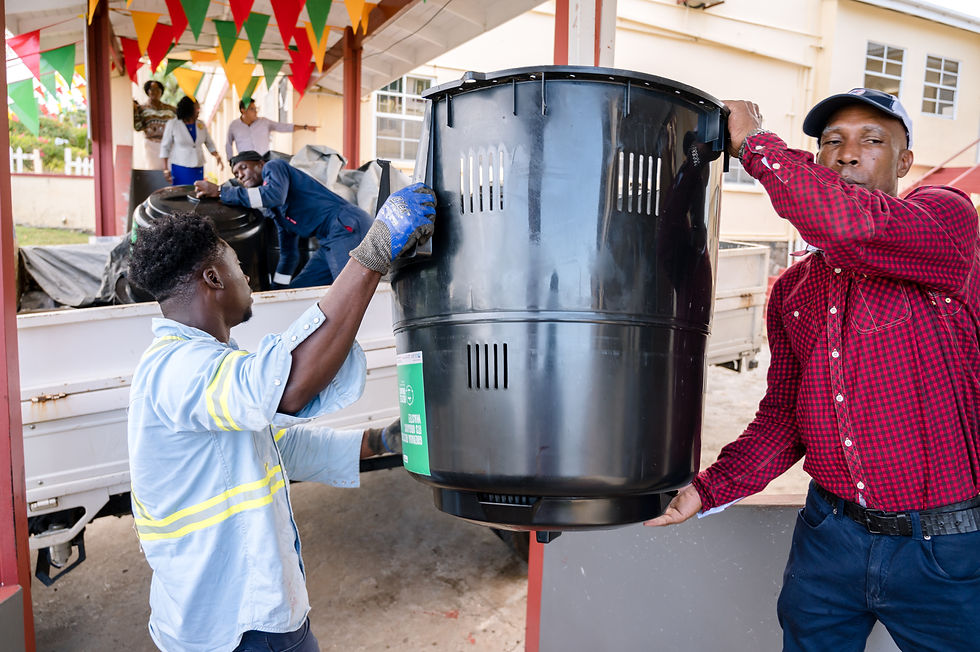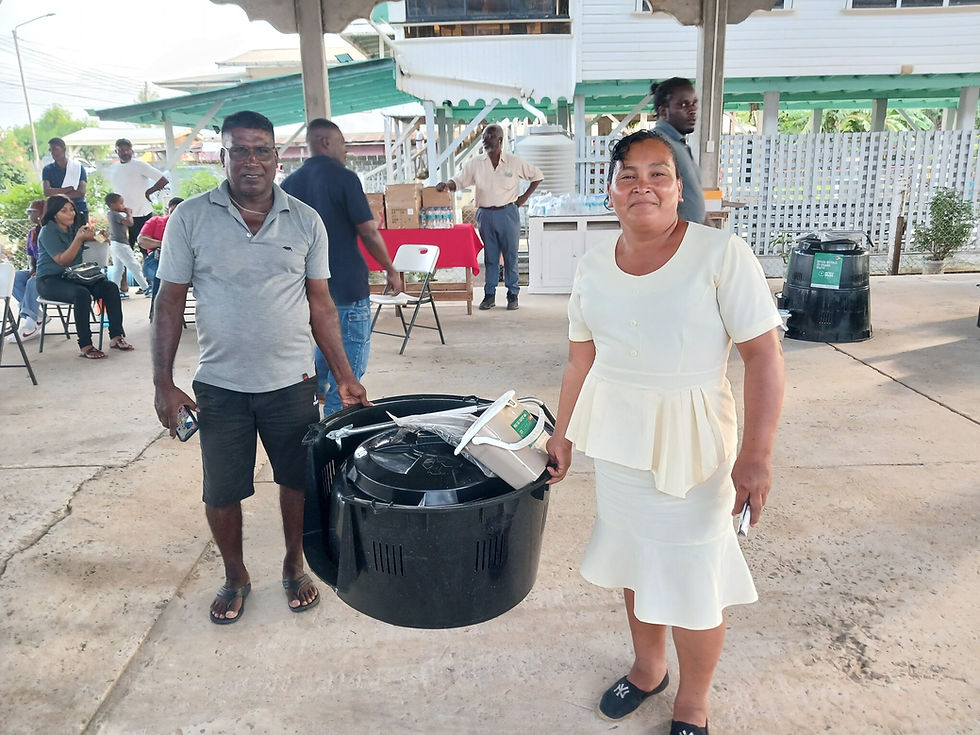Recycle Organics Hosts Methane Mitigation Workshop in Brazil on Scaling Organic Waste Solutions in Small Island Developing States
- Recycle Organics

- Sep 12, 2025
- 4 min read
Updated: Sep 24, 2025
“Deepening Impact, Expanding Action in SIDS” takes place September 23–25 in Florianópolis, Brazil. The workshop will bring together island nation leaders and global partners to scale waste solutions and climate action.
(Original story on recycleorganics.org)

As the climate crisis intensifies, Small Island Developing States (SIDS) remain among the world’s most vulnerable regions, despite contributing the least to global emissions. In response, the Recycle Organics Program has been supporting six island nations from Guyana to Fiji in transforming organic waste into climate solutions.
From September 23–25, Recycle Organics will connect national and local leaders, technical experts and strategic partners in Florianópolis, Brazil, for “Deepening Impact, Expanding Action in SIDS,” a regional workshop focused on accelerating and scaling sustainable organic waste management strategies across the Caribbean and Pacific.
Furthermore, this event celebrates 3+ years of impactful climate action in SIDS, made possible through the Program’s support from Environment and Climate Change Canada (ECCC). Across six SIDS, Recycle Organics has laid the foundation for lasting, replicable change by supporting the design and implementation of country-specific organic waste solutions that mitigate methane emissions, strengthen circular economies and help nations meet their climate targets and Nationally Determined Contributions (NDCs) under the Paris Agreement.

Co-led by ImplementaSur and the Center for Clean Air Policy (CCAP), the workshop will showcase the Program’s achievements and strengthen collaboration among stakeholders working to reduce methane emissions and promote circular economy practices in the waste sector.
Our Impact in SIDS
Since 2023, Recycle Organics has been working with Belize, Fiji, Grenada, Guyana, Saint Lucia and Samoa through locally tailored initiatives that emphasize long-term sustainability, institutional capacity and community-driven action. From providing a biodigester to the University of Guyana to shaping policies and regulations on methane mitigation and helping governments integrate organic waste into national climate strategies, the program is delivering tangible results in these climate-vulnerable island nations.
Recycle Organics has already delivered nearly 1,200 composting bins and equipment to diverse communities across these six SIDS. Looking ahead, by 2026, the initiative aims to grow that number to 3,100 composting kits to individuals and schools in over 25 countries worldwide—further strengthening local climate resilience and empowering communities to lead in organic waste solutions.

While the action has picked up on the ground, the Program also continues to act as a catalyst, facilitating knowledge exchange, unlocking finance and building the technical and institutional capacity needed to sustain and scale climate solutions in the waste sector. Key program results include:
Replicable pilot projects aligned with methane mitigation and NDC goals
Baseline studies and waste characterizations that inform national planning
Composting initiatives across households, farms, hotels and schools
Local and national planning and policy support that contributes to enhancing circular waste management frameworks
Training programs and peer-to-peer learning networks
Technical support to advance source separation and build green infrastructure
Methane mitigation targets and investment plans for developing project pipelines
National Monitoring, Reporting and Verification (MRV) protocols for quantifying GHG inventories and assessing mitigation actions
“What we’re building with Recycle Organics goes beyond providing compost bins or biodigesters—it’s really about unlocking the systems and partnerships that allow countries to turn waste into opportunity,” said ImplementaSur Director, Gerardo Canales. “In island contexts where resources are limited and the impacts of climate change have long been felt, organic waste solutions can accelerate broader change: strengthening local economies, improving public health and supporting climate goals. This workshop is a moment to reflect on the progress we’ve made, thinking through how we can keep working together to advance these solutions further.”

About the Event
The three-day workshop will:
Highlight country-level progress and methane mitigation potential through case studies and results analysis
Promote peer exchange among SIDS and Brazil government representatives, local consultants and implementing partners
Explore strategies for scaling and implementing sustainable projects beyond the current program’s scope
Feature site visits to local composting and waste diversion facilities in Florianópolis
Foster collaboration through bilateral consultations and regional dialogues
Align with global efforts such as the Global Methane Pledge and regional circular economy initiatives
Recycle Organics: Paving the Way Towards Circularity in 25 Developing Countries
Launched in 2017 to support Chile in developing its national organic waste strategy to reduce methane emissions, the Recycle Organics Program has since grown into a global initiative spanning 25 countries. With support from ECCC, the Global Methane Hub and the Climate & Clean Air Coalition (CCAC), the Program now supports a diverse portfolio of over 50 projects—ranging from large-scale landfill gas-to-energy systems to community composting and biodigesters for small farms.
Together with adjusting policy frameworks, these efforts have the potential to mitigate over 31 million tons of CO₂e over the next two decades and divert more than 700,000 tonnes of organic waste from landfills each year.
By working at both national and local levels, Recycle Organics ensures climate action is inclusive, grounded in local realities and designed for long-term impact. The Program continues to evolve—demonstrating that reducing methane emissions can also drive economic growth, support livelihoods and strengthen climate resilience.
As the effects of the climate crisis deepen, especially for vulnerable communities in SIDS and across the Global South, Recycle Organics is scaling its impact—expanding solutions, deepening south-south collaboration, and equipping governments and communities with the tools to turn waste into opportunity. This work goes beyond cutting emissions—it’s about building a resilient, circular future where local action drives global change.
Stay Connected!
There are numerous ways to stay connected with CCAP. Follow us on X (@CCAPolicy) and on Facebook & LinkedIn.
CCAP’s mission is to support every step of climate action, from ambition to implementation. A recognized world leader in climate policy and action, CCAP creates innovative, replicable climate solutions, strengthens capacities, and promotes best practices across the local, national, and international levels to accelerate the transition to a net-zero, climate resilient future. CCAP was founded in 1985 and is based in Washington, DC.





Managing the transition of an entire nation’s waste system requires a high level of vigilance and strategic planning. You have to monitor the "inputs" (waste collection), manage the "power" (institutional capacity), and ensure the "seals" (policies) are tight enough to prevent methane leakage.
This relentless focus on monitoring a complex system is the core mechanic of FNaF. In the game, you are a security guard managing a limited power supply while watching cameras to ensure "safety" until 6 AM.
Strong example of practical climate leadership. By focusing on mapquest driving directions organic waste and methane in SIDS, Recycle Organics shows how local solutions scale globally. Connecting island leaders, funders, and technical experts is how impact compounds—turning vulnerability into resilience, emissions cuts, and circular economies that actually deliver results for communities worldwide today.
Really appreciate how this post highlights the importance of collaboration in tackling environmental issues. It reminded me of how teamwork also plays a big role in research. Many scholars struggle with getting their work recognized globally, and that’s where an Academic Journal Submission Service can make a difference by helping them meet publication standards and share valuable studies especially those related to sustainability and climate action on a larger scale.
This workshop sounds like a powerful step toward turning Slither io organic waste into real climate solutions for SIDS, where the need is urgent and resources are limited. I’m especially inspired by how Recycle Organics combines local action with global collaboration to drive long-term resilience and impact.
شيخ روحاني
رقم شيخ روحاني
الشيخ الروحاني
الشيخ الروحاني
شيخ روحاني سعودي
رقم شيخ روحاني
شيخ روحاني مضمون
Berlinintim
Berlin Intim
جلب الحبيب
https://www.eljnoub.com/
https://hurenberlin.com/